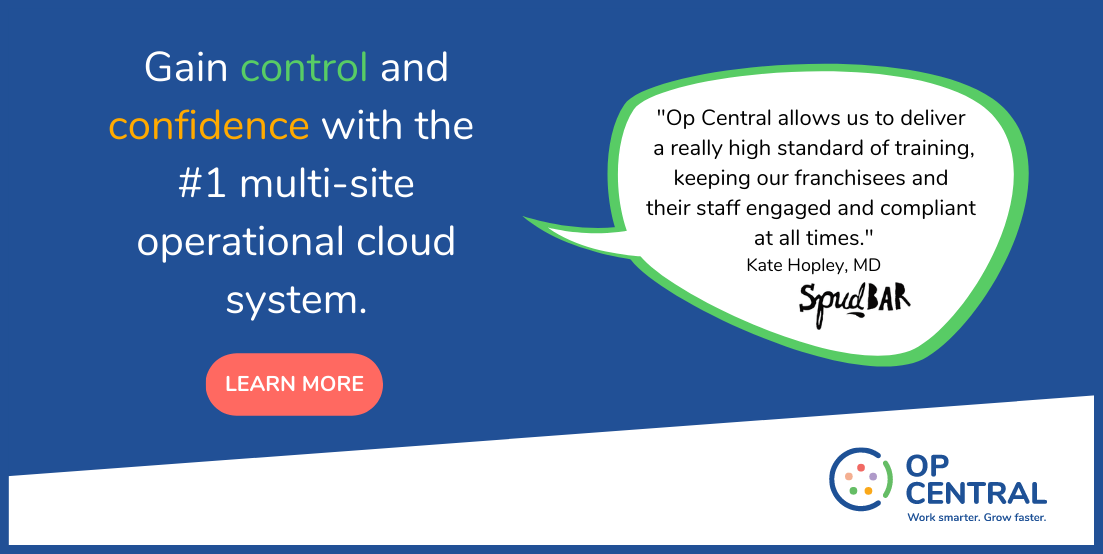

Op Central helps you achieve operational excellence by providing you with control and confidence.
Join the thousands of multi-site organisations reducing complexity with a single point of truth solution to ensure product, brand and customer experience consistency, manage compliance and drive revenue outcomes.
Used in 37 countries by many of Australia’s most trusted hospitality and QSR brands, such as The Cheesecake Shop, Fonda, Spudbar, Degani, La Porchetta, Rashays, Milky Lane and more, Op Central delivers peace of mind with Australia’s most comprehensive and easy to use operations, training and compliance management software platform.
To schedule a live demo, visit Op Central today.
Auditing QSR sustainability and why it matters for customers

Your food waste practices are in their radar.
In a world where consumers are becoming increasingly conscious of their environmental impact, QSR operators have a responsibility to ensure their operations are sustainable. Whether it’s reducing the amount of plastic used in packaging, optimising energy usage, or improving the efficiency of their supply chain, sustainability is becoming a key factor in the success of QSRs.
In Australia, where consumers are reported to have a high sustainability awareness, QSRs need to demonstrate their commitment to sustainability as part of their wider brand promise. According to a report by BCG, from 2020 to 2021, Australian consumers either adopted, maintained, or increased their use of sustainable practices at a rate of three in four people.
Operators who are looking to make their QSR operations more sustainable can consider taking an important first step: auditing their current practices. In this post, we’ll explore what it means to audit QSR sustainability, and why it matters for customers.
Auditing sustainability: Some basics
When it comes to auditing sustainability, there are a few processes you should consider. Firstly, it’s important to get a baseline of where you are. This means taking a look at all aspects of your QSR’s operations and identifying any inefficient practices that need improvement.
Some elements to consider include energy usage, waste management, water usage, and sourcing practices. For example, are you using environmentally friendly packaging or renewable energy sources? Are you disposing of food waste responsibly? By taking an honest look at your current practices, you can begin to identify areas for improvement.
You can use a framework such as the Global Reporting Initiative (GRI) to evaluate your sustainability performance. The GRI provides a comprehensive approach to reporting, taking into account social, environmental, and economic issues. It’s a useful tool for QSR operators who are looking to assess their sustainability performance to become more competitive in the industry.
The benefits of auditing QSR sustainability
By taking the time to audit and evaluate your current practices, you can begin to develop strategies for becoming more sustainable. This can bring a range of benefits, both for your business and your customers.
Improving your sustainability practices can help to reduce costs, improve efficiency, and strengthen your company’s reputation. It can also create a more positive customer experience, as customers know you are making an effort to reduce your environmental footprint.
Sustainability audits can also help to ensure compliance with government regulations and industry standards. With more and more governments introducing legislation to reduce the environmental impact of businesses, it’s important to stay up to date with the latest requirements.
Finally, these audits can also help you to identify opportunities for growth and innovation. By taking a closer look at your current practices, you can start to explore ways to reduce waste and become more efficient. This could mean introducing new technologies, such as automated ordering systems or cloud-based storage solutions.
Tech-based sustainability audits
Of course, it's not always as easy as it sounds. To effectively audit your QSR sustainability, you can take advantage of the latest technologies. Op Central, a cloud-based QSR platform, offers smart audits that enable operators to quickly identify areas of improvement and apply best practices.
With the help of customisable forms and checklists, operators can easily track their performance against key sustainability metrics. Features like automated notifications and email reminders help to ensure that reviews are completed on time and any deficiencies are addressed quickly.
The beauty of tech-based audits is that they can be done remotely, making it easier to conduct sustainability reviews at multiple locations. This means operators can quickly get a comprehensive view of their sustainability performance, enabling them to make data-driven decisions about how best to reduce their environmental impact.
Op Central allows operators to do any kind of audit per location. For example, a food waste audit can be done to compare data and see excessive waste or identify locations where food waste is low. Operators can then take action or reward locations with low waste.
Op Central: Smarter operations made easy
With the help of a platform like Op Central, QSR operators can take their sustainability efforts to the next level. They can then use the data from these audits to compare with country-wide and global benchmarks and develop strategies to improve their environmental performance.
Auditing your QSR sustainability doesn't have to be time-consuming or expensive. With the right platform, you can quickly and easily measure your sustainability performance and identify areas for improvement. With Op Central, operators can rest assured knowing they are doing their part to reduce their environmental impact.
Other Articles

3 tips for bulk recruiting holiday staff

8 ways to maintain clear and consistent standards for QSR success

3 recruitment challenges and what QSRs can do

How The Cheesecake Shop is taking compliance to the next level

Employee engagement: The difference between a good and a great QSR

4 simple steps towards greater quality control today

7 ways to successfully integrate new tech in your QSR business

Staying compliant in a constantly changing regulatory environment
